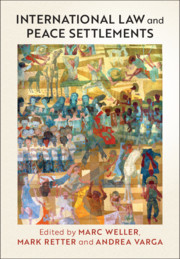Book contents
- International Law and Peace Settlements
- International Law and Peace Settlements
- Copyright page
- Contents
- Contributors
- Preface and Acknowledgements
- Case Law
- Peace Agreements and Instruments
- Abbreviations
- 1 Introduction
- Part I Historical Dimensions to Peace Settlement Practice
- Part II Peace Agreements As Legal Instruments
- Part III Key Actors and the Role of International Law
- Part IV Representation, Sovereignty and Governance
- Part V Economic Aspects of Peace Settlements
- 20 Political Economy, International Law and Peace Agreements
- 21 Balancing National Ownership with International Intervention
- 22 Sharing Resource Wealth in Conflict Settlements
- 23 Overcoming Violence in Maritime Conflicts with Provisional Arrangements
- 24 Financing Peace through Law?
- Part VI Humanitarian Obligations and Human Rights
- Conclusion
- Index
21 - Balancing National Ownership with International Intervention
Combating Illegal Exploitation of Natural Resources through Peace Processes
from Part V - Economic Aspects of Peace Settlements
Published online by Cambridge University Press: 14 January 2021
- International Law and Peace Settlements
- International Law and Peace Settlements
- Copyright page
- Contents
- Contributors
- Preface and Acknowledgements
- Case Law
- Peace Agreements and Instruments
- Abbreviations
- 1 Introduction
- Part I Historical Dimensions to Peace Settlement Practice
- Part II Peace Agreements As Legal Instruments
- Part III Key Actors and the Role of International Law
- Part IV Representation, Sovereignty and Governance
- Part V Economic Aspects of Peace Settlements
- 20 Political Economy, International Law and Peace Agreements
- 21 Balancing National Ownership with International Intervention
- 22 Sharing Resource Wealth in Conflict Settlements
- 23 Overcoming Violence in Maritime Conflicts with Provisional Arrangements
- 24 Financing Peace through Law?
- Part VI Humanitarian Obligations and Human Rights
- Conclusion
- Index
Summary
Exploitation of natural resources has become one of the principal means for parties to an armed conflict to finance their armed struggle. In response to this reality, several international approaches have been developed to curtail – what can be referred to as – ‘illegal’ exploitation of natural resources. The current chapter examines how ‘illegality’ is construed in this context and compares this to understandings of illegality within (domestic) peace settlements and the international legal framework for the governance of natural resources. The purpose of this inquiry is to understand how and to what extent international interventions support arrangements for the management of natural resources as set out in peace agreements. The chapter concludes that the international legal framework, international interventions and arrangements in domestic peace settlements are, for the most part, mutually supportive. At the same time, peace settlements tend to take a more expansionist approach of illegality compared to international interventions, including in their definition mismanagement of natural resources or their revenues by governments. Based on these precedents in domestic peace settlements, the chapter argues in favour of recalibrating conceptions of illegality in international approaches.
Keywords
- Type
- Chapter
- Information
- International Law and Peace Settlements , pp. 474 - 498Publisher: Cambridge University PressPrint publication year: 2021

